Despite its imposing size and powerful appearance, the Dogue de Bordeaux is not just a breed for experienced dog owners or those with ample space. While it's true that this magnificent French Mastiff can be quite large and requires moderate exercise, there's more to this breed than meets the eye.
From their loyal and affectionate nature to their calm demeanor, the Dogue de Bordeaux has a lot to offer as a family companion. But what makes them truly unique? Let's explore the fascinating world of the Dogue de Bordeaux and discover what sets them apart from other breeds.
Key Takeaways
- Dogue de Bordeaux is a large and powerful breed originating from France, known for their loyalty and protective nature.
- They have moderate exercise needs and require regular walks, playtime, and mental stimulation.
- Early socialization and positive reinforcement training are important for shaping their behavior.
- They are relatively low-maintenance in terms of grooming, but regular brushing and cleaning of skin folds are necessary.
Origin and Size
The Dogue de Bordeaux, a large and powerful breed, originated in the Bordeaux region of France and typically weighs between 99-145 pounds (45-66 kg). This breed is known for its impressive size and strength.
The Dogue de Bordeaux has a robust build, with a muscular frame and a broad head. Their body is well-balanced, and they've a deep chest and a powerful neck. The breed's size and physical characteristics make it an imposing presence.
The Dogue de Bordeaux's size contributes to its role as a guardian and protector. Their imposing stature and powerful presence serve as a deterrent to potential threats.
Lifespan and Coat
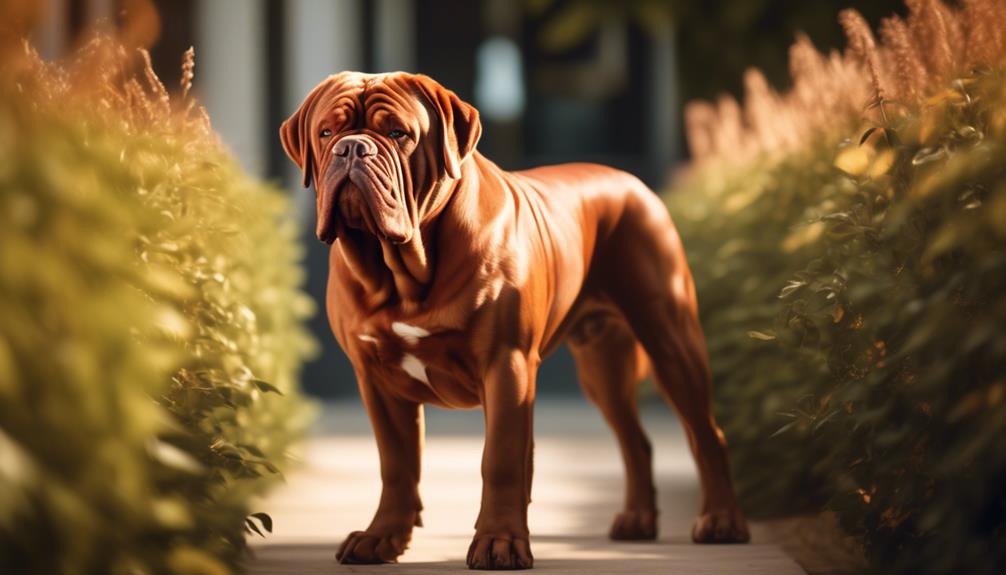
The Dogue de Bordeaux has a lifespan of approximately 6-10 years and possesses a short, dense coat with loose skin.
Here are four important facts about the lifespan and coat of the Dogue de Bordeaux:
- Limited Lifespan: With an average lifespan of 6-10 years, the Dogue de Bordeaux has a relatively short life expectancy compared to some other breeds. This highlights the importance of providing them with proper care and regular veterinary check-ups to ensure their well-being.
- Short, Dense Coat: The Dogue de Bordeaux's coat is short and dense, providing protection and insulation. This coat requires regular brushing to keep it healthy and free from tangles or mats. Additionally, due to their loose skin, it's crucial to clean their skin folds regularly to prevent infections.
- Heat Sensitivity: The Dogue de Bordeaux's short coat and loose skin make them more prone to heat sensitivity. It's important to provide them with a cool and shaded environment during hot weather to prevent overheating.
- Coat Colors: The Dogue de Bordeaux comes in various shades of fawn, ranging from light to dark. These different coat colors add to the breed's unique and attractive appearance.
Temperament and Exercise Needs
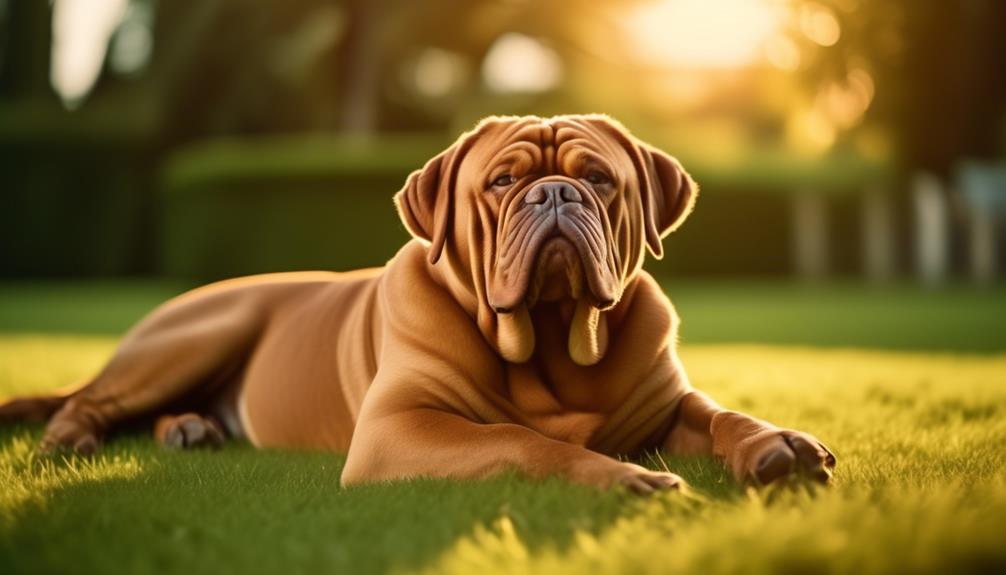
Having established the Dogue de Bordeaux's limited lifespan and unique coat characteristics, let's now delve into their temperament and exercise needs.
The Dogue de Bordeaux is known for its calm and gentle demeanor, making them affectionate and loyal companions to their families. They have protective instincts and are patient and tolerant, especially with children. However, they can be reserved around strangers and are independent thinkers.
In terms of exercise needs, the Dogue de Bordeaux requires moderate exercise. Regular walks, playtime, and mental stimulation are important to keep them physically and mentally stimulated. While they're relatively low energy, they still require regular activity to maintain their overall health and well-being.
Proper socialization and consistent training are essential to shape a well-rounded Dogue de Bordeaux.
Training and Grooming
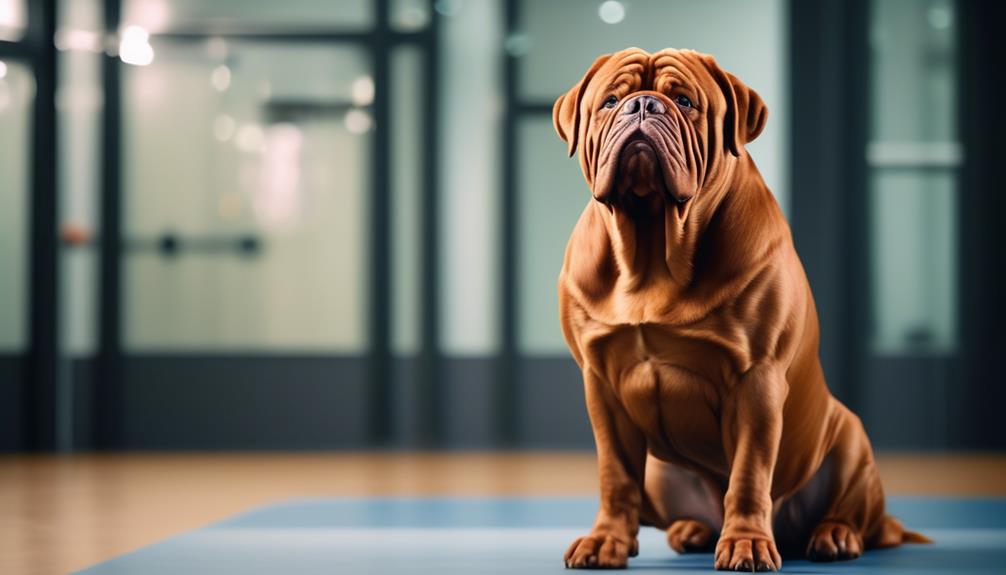
To properly train and groom a Dogue de Bordeaux, it's important to establish clear guidelines and provide consistent positive reinforcement. This breed is known for its loyalty, protectiveness, and affection towards its family. Training a Dogue de Bordeaux requires patience, as they can be strong-willed but generally eager to please.
Here are four key points to consider when training and grooming a Dogue de Bordeaux:
- Start early: Begin socializing and training your Dogue de Bordeaux from a young age to ensure they develop good manners and adapt well to different environments.
- Use positive reinforcement: Reward your dog with treats, praise, and affection to motivate and encourage good behavior. Avoid harsh training methods as they can be counterproductive.
- Be consistent: Set clear rules and expectations for your Dogue de Bordeaux and stick to them. Consistency is key to helping them understand what's expected of them.
- Practice proper grooming: Regular brushing is essential to keep their short coat healthy. Clean their skin folds to prevent infections. Additionally, trim their nails regularly and maintain oral hygiene to promote overall well-being.
Health Concerns and Fun Fact
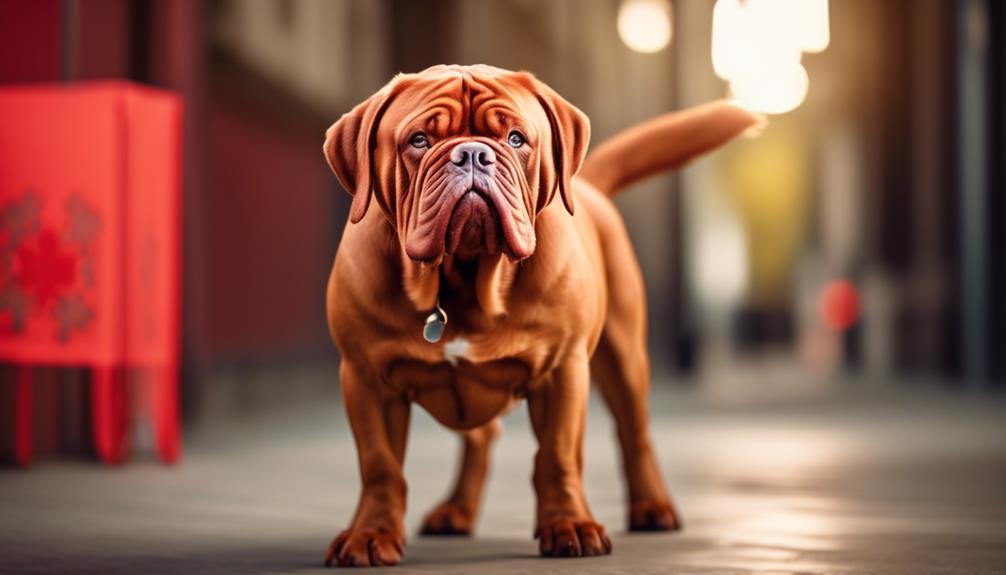
Hip dysplasia and heart problems are common health concerns for the Dogue de Bordeaux breed, but they aren't prevalent in all individuals. Responsible breeding practices can help minimize the risk of these conditions. Regular veterinary check-ups are important to monitor the dog's overall health.
Along with hip dysplasia and heart problems, other health issues that may affect the breed include elbow dysplasia, eyelid abnormalities, skin issues, and bloat. However, it's important to note that not all individuals will develop these conditions.
To promote overall health, a balanced diet, regular exercise, and a safe environment are crucial. It's recommended to feed the dog a high-quality diet, rich in protein and fat, and to consult with a veterinarian for guidance on feeding amounts.
Adaptability and Considerations for Apartment Living
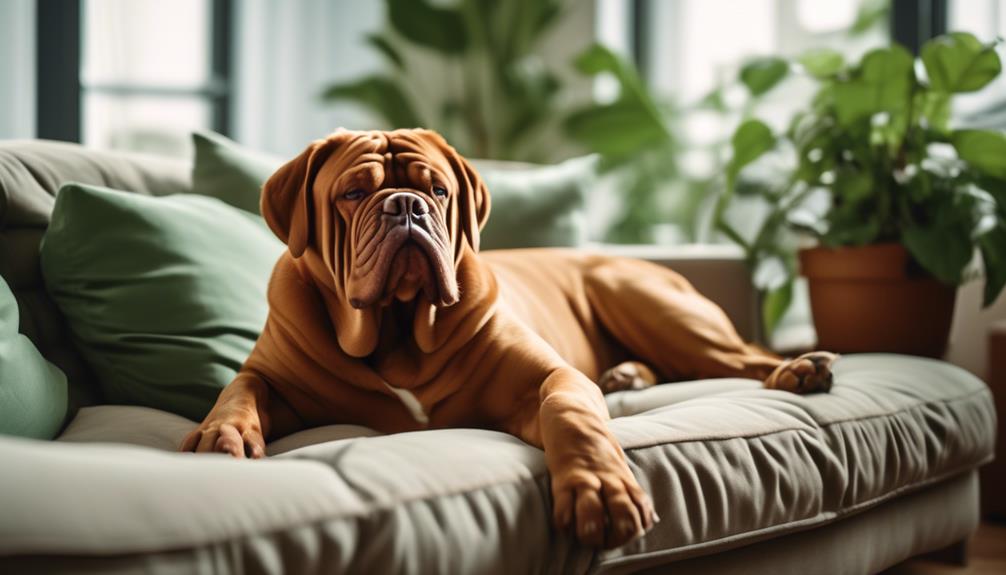
The adaptability of the Dogue de Bordeaux breed extends to various living situations, including apartment living, with certain considerations in mind.
Here are some key factors to keep in mind when considering a Dogue de Bordeaux for apartment living:
- Size: Despite being a large breed, Dogue de Bordeaux can adapt well to smaller living spaces as long as their exercise needs are met.
- Noise Level: Opt for a Dogue de Bordeaux that doesn't excessively bark to maintain a peaceful environment for you and your neighbors.
- Energy Levels: While Dogue de Bordeaux has a relatively low energy level, it's still essential to provide them with regular walks and mental stimulation to keep them content and prevent behavioral issues.
- Tolerance to Being Alone: Consider the breed's tolerance to being alone as some dogs may struggle with separation anxiety in an apartment setting.
Exercise Needs and Energy Levels
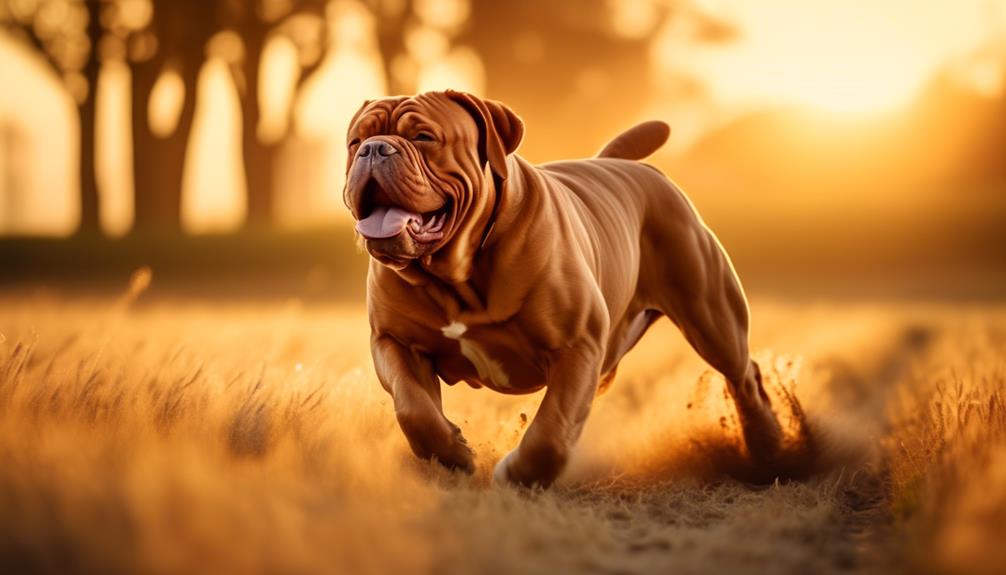
Dogue de Bordeaux breed has specific exercise needs and energy levels that should be considered for their overall well-being.
These dogs have a moderate level of exercise requirements. Regular walks, playtime, and mental stimulation are important for their physical and mental health. While they aren't high-energy dogs, they still benefit from daily exercise to prevent weight gain and promote a healthy lifestyle.
Dogue de Bordeaux aren't the type of dogs that require vigorous exercise, but they do enjoy activities that engage their senses and keep them mentally stimulated. It's important for owners to match their own activity level and lifestyle with the exercise needs of this breed to ensure a happy and balanced companion.
Personality and Proper Care
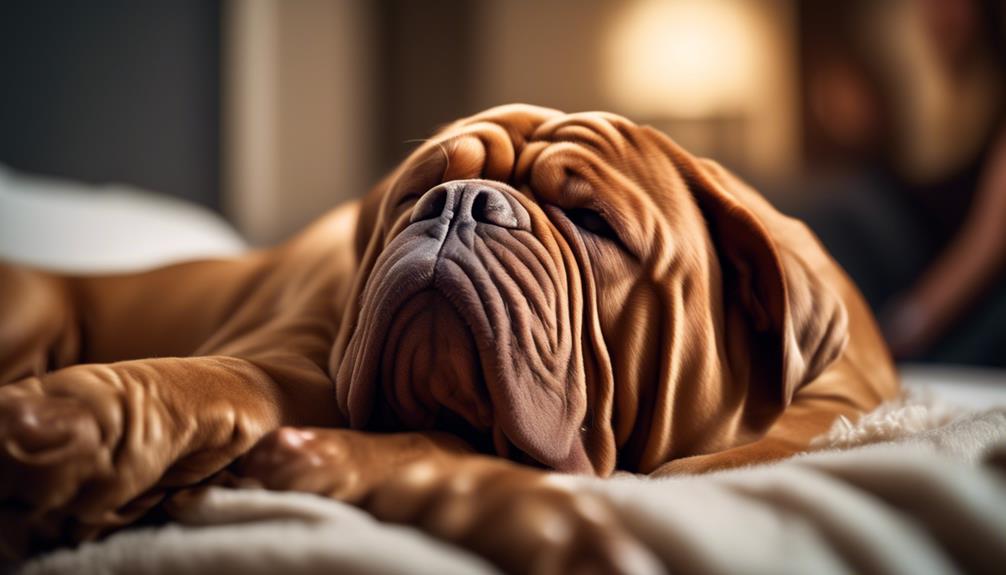
To properly care for a Dogue de Bordeaux, it's important to understand their personality traits and provide them with the necessary care they require. Here are some key aspects of their personality and the care they need:
- Calm and Gentle Demeanor: Dogue de Bordeaux have a naturally calm and gentle demeanor, making them excellent companions for families and children.
- Affectionate and Loyal: These dogs are known for their strong bond with their families. They're affectionate and loyal, always seeking to please their loved ones.
- Protective Instincts: Dogue de Bordeaux have a natural instinct to protect their family and property. Proper socialization and training are essential to ensure they understand when to be protective and when to be calm.
- Independent Thinkers: While they're generally obedient, Dogue de Bordeaux can also be independent thinkers. Consistent care and training are important to establish boundaries and reinforce desired behaviors.
Frequently Asked Questions
Are Dogue De Bordeaux Good With Children?
Yes, Dogue de Bordeaux are good with children. They have a calm and gentle demeanor, are patient and tolerant, and are known to be affectionate and loyal. However, proper socialization and training are essential for shaping their behavior.
How Much Exercise Does a Dogue De Bordeaux Need?
A Dogue de Bordeaux needs regular exercise to maintain a healthy weight and mental stimulation. They have a moderate exercise requirement, including regular walks and playtime. Providing them with adequate exercise is important for their overall well-being.
Can Dogue De Bordeaux Be Trained to Be Guard Dogs?
Yes, Dogue de Bordeaux can be trained to be guard dogs. Their protective instincts and loyalty make them suitable for this role. Proper socialization and consistent, positive reinforcement training are essential for shaping them into effective guard dogs.
What Are the Common Health Issues That Affect Dogue De Bordeaux?
The common health issues that affect Dogue de Bordeaux include hip and elbow dysplasia, heart problems, eyelid abnormalities, skin issues, and bloat. Responsible breeding practices and regular veterinary care are important for minimizing the risk of these conditions.
Are Dogue De Bordeaux Suitable for Apartment Living?
Dogue de Bordeaux may not be suitable for apartment living due to their large size and moderate exercise needs. However, individual dogs' energy levels and adaptability can vary, so it's important to consider their specific needs and consult with a reputable breeder or rescue organization.
How Does the Coton De Tulear Compare to the Dogue De Bordeaux in terms of temperament and care needs?
When comparing the Coton de Tulear breed characteristics to those of the Dogue de Bordeaux, there are notable differences in temperament and care needs. The Coton de Tulear is known for being affectionate and adaptable, while the Dogue de Bordeaux requires more exercise and grooming due to its larger size.
Conclusion
In conclusion, the Dogue de Bordeaux is a striking and powerful breed originating from France. With their loyal and protective nature, they make great companions for families.
While they require moderate exercise and grooming, they're generally low-maintenance. It's important to note their potential health concerns and the need for responsible breeding and regular veterinary care.
Overall, the Dogue de Bordeaux is a wonderful breed that thrives with proper care and attention.




